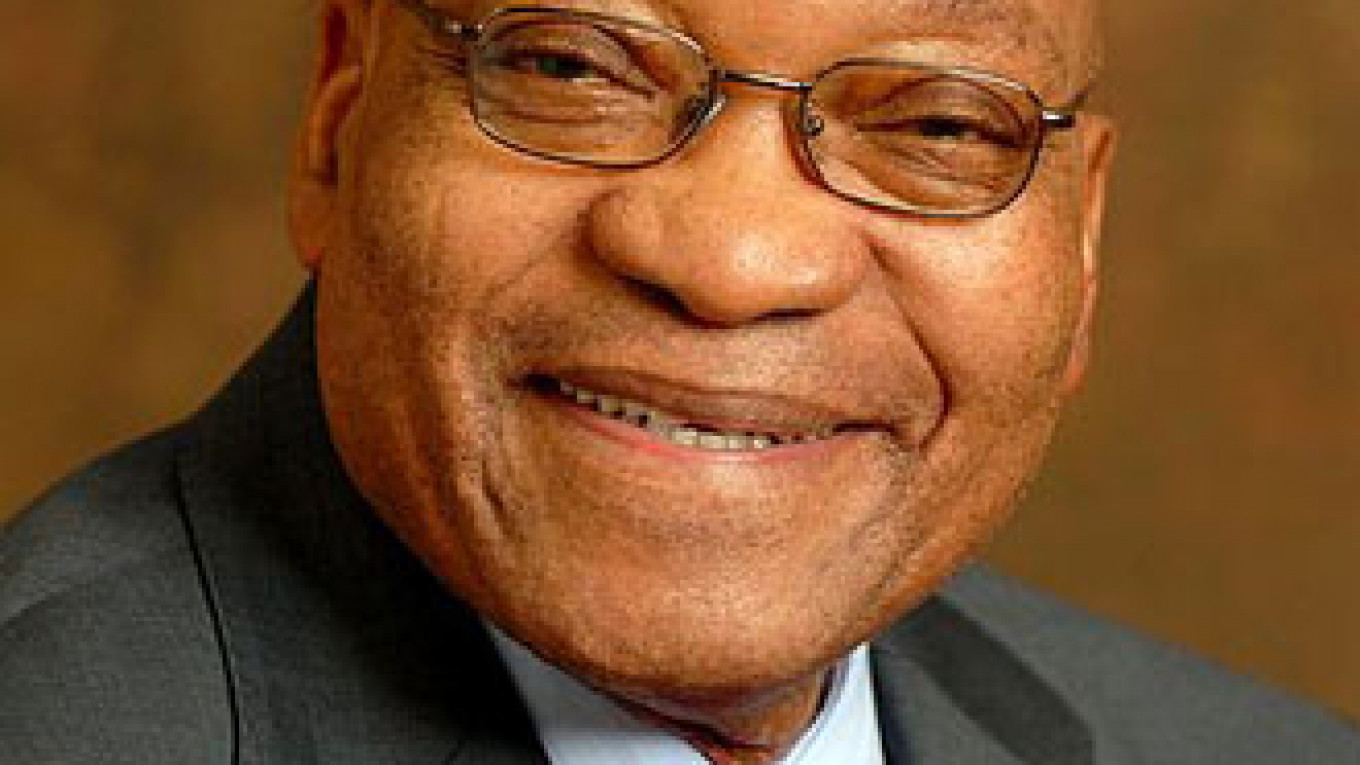South Africa will push for expansion of both trade and direct investment as President Jacob Zuma visits Moscow on Thursday in the latest leg of a worldwide tour to expand ties with BRIC countries, Trade Minister Rob Davies said in an interview.
Zuma was scheduled to arrive Wednesday evening ahead of talks with President Dmitry Medvedev on Thursday and further meetings Friday in Moscow. The presidents had planned to meet in Sochi, but Medvedev returned to Moscow on Wednesday to oversee efforts to fight wildfires raging across the country.
South Africa, which has the continent's largest economy, has been on a quest for recognition among Brazil, Russia, India and China — the emerging powerhouse economies that have been building more formal ties as the BRIC bloc.
While South Africa's trade decreased with European markets last year, it has stayed consistent with BRIC countries, Davies said.
Trade with Russia has jumped from 500 million rand in 1995 to 4.25 billion rand ($584 million) in 2008, which "is still below potential," he said, adding that he did not have figures for 2009.
"Whether or not we formally enter [BRIC] is not so much the issue, but we are looking to deepen our relationships with the BRIC countries," Davies said on the sidelines of a Russia-South Africa investment forum.
The BRIC countries and Africa represent the biggest prospects for new growth, as South Africa is "finding it difficult to pick up trade with Western Europe," Davies said.
"The IMF has called Africa the next growth story. It doesn't always get it right, but on this one I think it probably has."
Zuma, who took office in May 2009, visited Brazil in April while leaders from the BRIC countries were also there. In June, he traveled to India, and he is scheduled to head on to China later this month.
South Africa has already developed relationships with Brazil and India through IBSA, or the India-Brazil-South Africa Dialog Forum, a group formed in 2003 to promote ties among Southern countries.
Johannesburg has "learned a lot" from Brazil and India and participated in the joint IBSA/BRIC combined meeting in Brazil this year, Davies said.
Zuma will look to bolster bilateral trade and access to the Russian market, with agreements related to sanitary and phytosanitary norms to be signed in course of the visit, Davies said. South Africa is an exporter of fruits and flowers to Russia.
The country will also push forward several specific projects, including a partnership using Russian technology to turn mineral sands into titanium, zirconium and silicone, Davies told The Moscow Times. "We want to add value and not just export sand out of the beach."
In another partnership, Russian coal and steel firm Mechel and South Africa's Bateman Group, a mining engineering firm, may be developing a number of projects in Russia, namely on the platinum-group minerals, he said.
South Africa is also struggling with an energy deficit and is looking to build "at least one and possibly two" new nuclear plants, which Rosatom may help develop in the mid- to long-term, he said.
No tenders have been issued yet, but discussions have taken place, said Davies, who took over as trade minister in May 2009.
A delegation visited Rosatom's subsidiary Tvel, which makes nuclear fuel, on Monday, Tvel said in a statement Wednesday.
South Africa is "looking for a supplier of nuclear fuel for future nuclear plants," David Nichols, lead engineer of South African company Eskom, said in the statement.
The country is also planning to buy power from the Kudu gas-powered plant in Namibia that is partly owned by Gazprom, though it "won't be a large part of the overall energy mix," Davies said.
Business ties between have already been growing through a number of prominent acquisitions in recent months.
South African multimedia company Naspers purchased around 29 percent in Digital Sky Technologies, which owns Mail.ru and holds stakes in a number of social networks and other web sites.
Additionally, South Africa's Standard Bank has built up a stake of 36 percent in Troika Dialog, while Renaissance Capital said last month that it had completed the acquisition of South African brokerage BJM Securities.
South Africa is also ready to share its experience on hosting the World Cup, which Davies estimated boosted its gross domestic product by 0.5 to 1 percentage points.
"We gained a huge reputational benefit. I'm sure we would be willing to share our experiences as Russia prepares its bid," he said. Russia has said it wants to host football's premier event in 2018 or 2022.
In an interview with Itar-Tass published Wednesday, Zuma portrayed his country as a gateway to investment and business throughout Africa.
"If you have good relations with South Africa, you gain easy access to other African countries," he said.
Medvedev did not visit the country while on a four-state tour of South Africa last year. Then-President Vladimir Putin visited South Africa in 2006, meeting with then-President Thabo Mbeki.
A Message from The Moscow Times:
Dear readers,
We are facing unprecedented challenges. Russia's Prosecutor General's Office has designated The Moscow Times as an "undesirable" organization, criminalizing our work and putting our staff at risk of prosecution. This follows our earlier unjust labeling as a "foreign agent."
These actions are direct attempts to silence independent journalism in Russia. The authorities claim our work "discredits the decisions of the Russian leadership." We see things differently: we strive to provide accurate, unbiased reporting on Russia.
We, the journalists of The Moscow Times, refuse to be silenced. But to continue our work, we need your help.
Your support, no matter how small, makes a world of difference. If you can, please support us monthly starting from just $2. It's quick to set up, and every contribution makes a significant impact.
By supporting The Moscow Times, you're defending open, independent journalism in the face of repression. Thank you for standing with us.
Remind me later.






